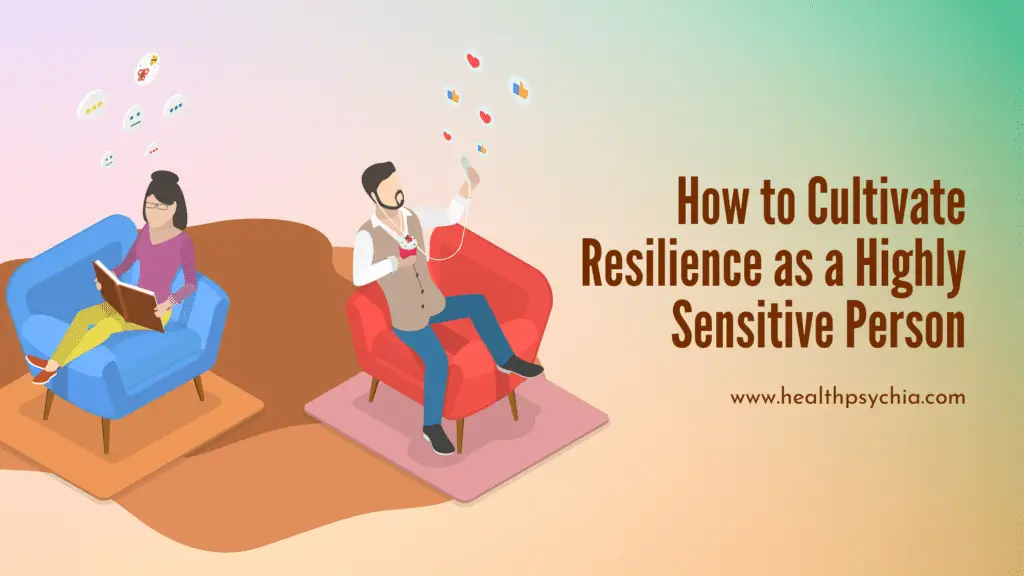Being a highly sensitive person (HSP) comes with its own set of challenges. HSPs often find themselves easily affected by their environment, experiencing intense emotions, and possessing heightened empathy.
Although having these characteristics might increase stress, it is essential for very sensitive people to develop resilience and do well in a variety of circumstances. In this article, we look at many tactics and ideas that might empower HSPs to become resilient and face the outside world with assurance.
Understanding Highly Sensitive Person
Let’s have a deeper look at exactly what it signifies to be a very sensitive person before we discuss resilience-building techniques. Highly sensitive people have a deeper capacity for processing sensory data, which further influences their emotional reactions.
They could find that loud sounds, bright illumination, or crowded areas easily overwhelm them. HSPs also have a tendency to be empathic in nature, perceiving others’ delicate emotional cues and feeling their own emotions more strongly.

Superpowers of a Highly Sensitive Person
People who are very sensitive have a special set of abilities that may be used to get through difficult situations. Intelligence, creativity, empathy, awareness of oneself, insight, and perception are some of these abilities. By recognizing and leveraging these strengths, HSPs can proactively prepare themselves to handle environments that may not naturally align with their sensitivities.
When facing an upcoming event or situation, use your intelligence and imagination to develop coping skills specific to your needs. Consider creating a toolkit of strategies that can help you adjust to unexpected circumstances. By doing so, you will be better equipped to navigate overstimulating environments and maintain emotional balance.
Stepping Outside Your Comfort Zone
- Building resilience requires stepping outside your comfort zone and gradually pushing your boundaries. Just like building physical strength at the gym, emotional strength is developed through progressive exposure to discomfort. Start small by engaging in mildly discomforting activities that challenge your sensitivity.
- For instance, if being around a lot of people makes you uneasy, consider wearing earbuds and staying in a busy spot for 30 minutes. Raise the period of time that you pass in these settings as you get more comfortable.
- Prepare for difficult social interactions by rehearsing potential scenarios and developing strategies to manage triggers. Remember, avoiding discomfort hinders emotional growth, so embrace the opportunity to expand your comfort zone.
Believing in Yourself

It is essential to believe in yourself and embrace your unique qualities as a highly sensitive person. Your sensitivity does not need to be changed or diminished. Instead, focus on developing coping strategies that allow you to navigate overstimulating environments and challenging social interactions without compromising your authenticity.
Resilience is not about erasing your sensitivities but rather finding ways to thrive despite them. Embrace the fact that you experience the world differently and recognize the strengths that come with being highly sensitive.
Sharing Your Experiences
- One of the difficulties that extremely sensitive people experience is an absence of awareness from others.
- Many individuals may only partially grasp what it takes to be extremely sensitive.
- Revealing your tales, on the other hand, can help raise awareness and develop more supportive connections.
- Consider trusting in close companions, family members, and coworkers about your extremely sensitive personality. S
- hare your point of view and describe what it feels like to explore the world with extra awareness.
- Discuss the methods and approaches which help you tackle difficult circumstances more successfully.
- Educating others can lead to greater understanding and empathy, ultimately strengthening your support network.
Finding Your Community

Although being extremely sensitive can often make you feel alone, it may be possible to locate a group of like-minded people who have gone through the same things. Making connections with people who are aware of the difficulties and benefits of greater awareness may be a tremendous source of support and affirmation.
Look for online forums, discussion boards, or social gatherings designed especially for those with high levels of sensitivity. Talk to people, tell tales, and take advantage of the chance to establish connections with people who can actually relate to your trip. It might be simpler to learn about the world and appreciate the special characteristics of being highly sensitive if you have a supportive group nearby.
Seeking Professional Support
Building resilience is a process that could benefit from expert advice from an expert in mental health. Look into therapy or counseling if you discover that your highly sensitive nature has significant adverse effects on your everyday life and mental well-being.
Your sensitivities can be explored and understood more thoroughly by a qualified therapist. They may provide you with methods and skills for controlling your emotions, managing stress, and creating coping mechanisms suited to your own requirements. Always remember that asking for help from a professional is a show of strength and an active move toward development and resilience.
Practicing Self-Care
Everyone has to take care of themselves, but a highly sensitive person needs to do it much more. Setting self-care as a priority aids in maintaining emotional control, stress reduction, and general well-being. Include activities that are good for your body, thoughts, and spirit in your everyday routine.
Practice exercises like yoga, writing, meditation, or time spent in nature. You may improve your resilience, restore your energy, and find your center with the aid of these techniques. Make sure that you are also getting adequate restful sleep, eating a nutritious diet, and exercising frequently. Maintaining good physical health helps you feel emotionally balanced overall.
Embracing Growth and Learning
It is as a highly sensitive person is an ongoing process of growth and learning. Accept the difficulties you face as opportunities to grow yourself. Positive or negative, every event may teach you something that will make you more resilient.
Be ready for new ideas, pursue information, and participate in personal development activities. You will be more equipped and more resilient with this attitude to deal with the challenges that life brings. Resilience is an ongoing path of discovery of oneself and progress, not a destination.
Conclusion
Being a highly sensitive person is not required to embrace a life of perpetual stress and overload. You may build resilience and survive in an environment that might not always comprehend your sensitivities by putting the tips in this article into practice.
Step out of your zone of comfort, appreciate your abilities, and look for help from a group of others who share your beliefs. Keep in mind to take care of yourself, have confidence in yourself, and see setbacks as chances for personal development. By doing this, you will not only travel through life as a highly sensitive individual but also flourish and motivate others.


